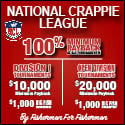Too many unknowns. There are switches called "make before break" that make sure the second battery is connected to the outboard before the first is disconnected.
Many outboards don't have enough charging capacity to even consider trying this, and even with larger outboards with alternators it's only useful if you make long runs at high speeds so the alternator has time to do any charging.
Crappie fishermen tend to spend much more time fishing than running, so in many cases they can't even keep their outboard battery charged, let alone a TM battery too.


 Likes:
Likes:  Thanks:
Thanks:  HaHa:
HaHa: 

 Reply With Quote
Reply With Quote The word "BOAT" stands for "Bring Out Another Thousand"
The word "BOAT" stands for "Bring Out Another Thousand"


















